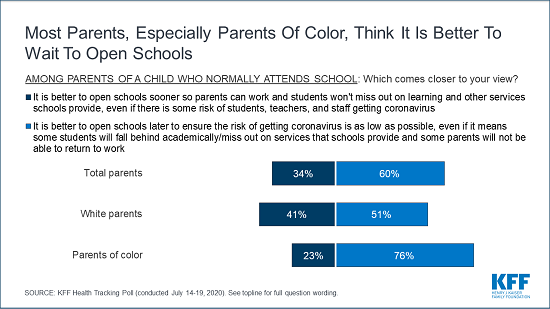By Nearly a 2-1 Margin, Parents Prefer to Wait to Open Schools to Minimize COVID Risk, with Parents of Color Especially Worried Either Way
Majorities Across Parties Want Congress to Prioritize Funding for COVID Testing, Tracing, and PPE
Most Say Things Will Get Worse Before They Get Better, and Just Over Half Now Say Their Mental Health is Worse Because of Coronavirus Worry and Stress
As state and local officials prepare for the new school year amid the COVID-19 pandemic, parents with children who normally attend school overwhelmingly prefer that schools wait to restart in-person classes to reduce infection risk (60%) rather than open sooner so parents can work and students can return to the classroom (34%), the latest KFF tracking poll finds. Parents of color (76%) are even more likely than white parents (51%) to prefer that schools wait to return to in-person classes.
With President Trump calling for schools to reopen and threatening to withhold federal funds from schools that don’t do so, there is a big partisan divide – with 87% of Democrats and 59% of independents preferring schools open later while 60% of Republicans prefer that schools open sooner.

The cautious approach to reopening schools may reflect a lack of confidence that schools have the resources to do so safely. Large majorities of the public (71%) say the public schools in their area need more resources to comply with public health recommendations around reopening, and 66% of parents say the same thing about their own child’s school.
“It’s a no-win choice for parents, but most are erring on the side of protecting kids, teachers and families by delaying school reopening and keeping kids home,” KFF President and CEO Drew Altman said.
The poll also shows how parents are pulled in both directions at once on the issue of school reopening.
Most parents with a child who normally attends school are worried about teachers and staff getting sick from coronavirus (79%) and children being unable or unwilling to comply with physical distancing practices (73%). But, nearly as many are worried about their child (70%) or themselves or a family member (69%) getting sick from coronavirus and that their child’s school will be unable to comply with public health recommendations (66%).
However, if schools don’t reopen, about two thirds say they worry about their children falling behind socially and emotionally (67%) and academically (65%). About half say they worry about losing income because they can’t go to work (51%) and not being able to pay enough attention to their kids while working at home (47%). Smaller shares worry about not getting needed social services (40%), and not having access to technology needed for online learning (31%), and their child not having enough food to eat (24%).
More Articles
- Hope: A Research-based Explainer by Naseem S. Miller, The Journalist's Resource
- 2024 Tax Filing Season Set for January 29; IRS Continues to Make Improvements to Help Taxpayers
- Rosalynn Carter: Do What You Can To Show You Care About Others, and You Will Make Our World a Better Place
- Women's Labor Force Exits During COVID-19: Differences by Motherhood, Race, and Ethnicity
- Selective Exposure and Partisan Echo Chambers in Television News Consumption: Innovative Use of Data Yields Unprecedented Insights
- The White House, President Joe Biden: Executive Order on Reducing Gun Violence and Making Our Communities Safer
- Congressional Budget Office: Federal Budget Deficit Totals $1.4 Trillion in 2023; Annual Deficits Average $2.0 Trillion Over the 2024–2033 Period
- Remarks by Secretary of the Treasury Janet L. Yellen at the Bureau of Engraving and Printing Facility in Fort Worth, Texas
- At "Toward an Inclusive Recovery," a research seminar sponsored by the Board of Governors of the Federal Reserve System, Washington, D.C.
- GAO High Risk List, Public Health Preparedness: *HHS Should Address Strategic National Stockpile Requirements and Inventory Risks






